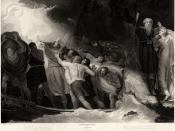Concepts
Concept 1: Imaginative journeys transcend the physical world allowing the traveller to gain insights not possible through any other experience.
Concept 2: The imaginative journey broadens the mind of an individual to take them into worlds of inspiration, speculation and imagination.
USE CTEEQ
'Holistic understanding of text that explains these concepts'
Intellectual discovery of inspirational literature by an individual Keats
Imaginative journeys demonstrate an ability which can place inspiration in our thoughts, allow us to speculate what exactly it is, we are willing to achieve, and also broaden our imagination allowing us to be in a greater state of understanding as to what journeys on a whole can offer us.
The journey, especially in the imaginative sense, is a process by which the traveller encounters a series of challenges, tangents and serendipitous discoveries to arrive finally, at a destination and/or transformation.
(Texts: The Tempest, The Ivory Trail, On First looking into Chapman's Homer, Invented Memories of Tomorrow)
General Introduction
1) Studying journeys has allowed me to understand that certain texts consist of multifaceted concepts of which the imaginative journey is unique.
Through an array of devices, the texts' composers exemplify that the imaginative journey is a vital aspect in gaining new insights. [Link to Q]Correspondingly, the imaginative journey transcends the physical world allowing the traveller to gain insights not possible through any other experience while also broadening the mind of an individual to take them into worlds of inspiration, speculation and imagination.
2) Concept 1: Imaginative journeys transcend the physical world allowing the traveller to gain insights not possible through any other experience. In The Tempest this is reflected through the characterisation of Prospero, who was captive to his obsession with revenge, due partly to his irresponsibility as ruler caused by his concern instead for his 'books' which...


